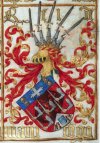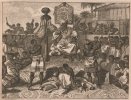A new Kongo
The air was humid, the sun harsh, the river sounded like thunder during a heavy storm as an enormous crowd cheered on. Everyone wants to witness these mad men take on the river that devours all others. The Mbanda Mbanda and the Mwene Kongo looked on in enjoyment.

He closes his eyes, this had been his dream since he was a little boy living in Inga. To descend the great rapids of the Congo. Beatriz looks at him "I love you" she says. Pedro is visibly nervous "I love you too", there is a weird tension in the air. "Please be careful, I need you", she grabs his hand and brings it to her belly, "we need you". He smiles and closes his eyes again, he does not want to think about that right now. If you ask him the only father that was worth something is in heaven, he wonders, does he even know how to be a father? His mind wanders again thinking about his youth living in Inga with his father.

Inga was a workers town, it had attracted thousands of workers from several surrounding and far away countries. It's population was made up of Kongolese, Congolese, Chinese, Angolans, Brazillians, Cape Verdeans and Cubans. And had been known for alcoholism, prostitution, poverty and the Catholic church. The people of Inga were described as either devout catholics who looked down on any and everything or daily consumers of the many bars and brothels. Pedro's father had been both. He always kept up the appearance of a good catholic family. But developed a love for women and sugar cane wine. His father had left their village in search of job opportunities. Pedro's mother had send him away with his father. To learn how to provide, work hard and be a man. Since that day Pedro had hated his mother. When they arrived in Inga he was shocked.
This place of poverty and depravity next to the nations crown jewel.
What he hated most was the noise, in Inga you would always hear the sounds of construction throughout the day and partying at night. Even at home or in church his father was loud when drunk and the local preachers were just as loud when preaching. But the thunderous rapids always managed to drown out the noise of Inga. The noise of his father, the noise of the poor, the noise of the preachers, the noise of...

Pedrooo Pedrooo pequino N'Kosi everyone is waiting are we doing this or what, said João one of his best friends. He puts on his wetsuit. This is the last time he can drown out the noise. His heartbeat speeds up and his mind starts racing. The Mbanda Mbanda told him Grande Inga will turn the noise into prosperity. He puts on his helmet. João gives him a reassuring look "this is it Pedro". He gets in his kayak. The sound of the rapids is deafening. The feeling of fear starts to take over his mind. He proceeds to pray "Ave Maria Uafulukua ye nsambu O, Amen". When he opens his eyes again João has disappeared. He pushes his paddle off the platform. God bless Kongo and may God save my soul.
Excerpt of the biography about famous whitewater kayaker Pedro Mvimba da Silva and his descend of the lower Congo rapids. A man of baKongo heritage his story of hardship, faith and hope. Is one of many that exemplify the early modern history of Kongo. This book will take us from the great migration of the Bantu all the way to the modern time and the eventual completion of Grande Inga.
A comprehensive history of the Kingdom of Kongo from the Bantu migration to Grande Inga.
Front Cover

Back Cover

He closes his eyes, this had been his dream since he was a little boy living in Inga. To descend the great rapids of the Congo. Beatriz looks at him "I love you" she says. Pedro is visibly nervous "I love you too", there is a weird tension in the air. "Please be careful, I need you", she grabs his hand and brings it to her belly, "we need you". He smiles and closes his eyes again, he does not want to think about that right now. If you ask him the only father that was worth something is in heaven, he wonders, does he even know how to be a father? His mind wanders again thinking about his youth living in Inga with his father.
Inga was a workers town, it had attracted thousands of workers from several surrounding and far away countries. It's population was made up of Kongolese, Congolese, Chinese, Angolans, Brazillians, Cape Verdeans and Cubans. And had been known for alcoholism, prostitution, poverty and the Catholic church. The people of Inga were described as either devout catholics who looked down on any and everything or daily consumers of the many bars and brothels. Pedro's father had been both. He always kept up the appearance of a good catholic family. But developed a love for women and sugar cane wine. His father had left their village in search of job opportunities. Pedro's mother had send him away with his father. To learn how to provide, work hard and be a man. Since that day Pedro had hated his mother. When they arrived in Inga he was shocked.
This place of poverty and depravity next to the nations crown jewel.
What he hated most was the noise, in Inga you would always hear the sounds of construction throughout the day and partying at night. Even at home or in church his father was loud when drunk and the local preachers were just as loud when preaching. But the thunderous rapids always managed to drown out the noise of Inga. The noise of his father, the noise of the poor, the noise of the preachers, the noise of...
Pedrooo Pedrooo pequino N'Kosi everyone is waiting are we doing this or what, said João one of his best friends. He puts on his wetsuit. This is the last time he can drown out the noise. His heartbeat speeds up and his mind starts racing. The Mbanda Mbanda told him Grande Inga will turn the noise into prosperity. He puts on his helmet. João gives him a reassuring look "this is it Pedro". He gets in his kayak. The sound of the rapids is deafening. The feeling of fear starts to take over his mind. He proceeds to pray "Ave Maria Uafulukua ye nsambu O, Amen". When he opens his eyes again João has disappeared. He pushes his paddle off the platform. God bless Kongo and may God save my soul.
Excerpt of the biography about famous whitewater kayaker Pedro Mvimba da Silva and his descend of the lower Congo rapids. A man of baKongo heritage his story of hardship, faith and hope. Is one of many that exemplify the early modern history of Kongo. This book will take us from the great migration of the Bantu all the way to the modern time and the eventual completion of Grande Inga.
A comprehensive history of the Kingdom of Kongo from the Bantu migration to Grande Inga.
Front Cover
Back Cover

